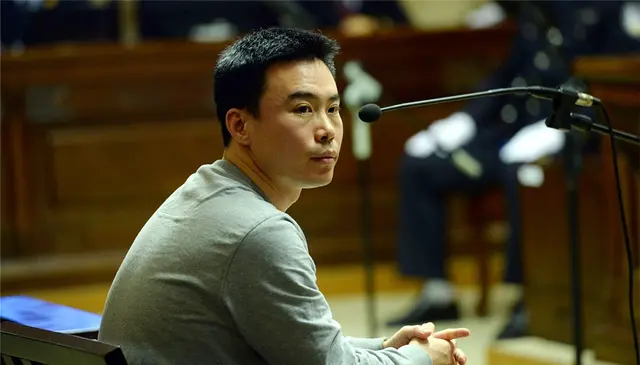QVOD Chief Executive Wang Xin at last week’s trial in Beijing. He is among four QVOD executives charged with propagating pornography for profit. All four defendants pleaded innocent.PHOTO:JHPHOTO/IMAGINECHINA/ASSOCIATED PRESS
(THE WALL STREET JOURNAL) It isn’t always clear how Internet companies in China handle their relationship with thegovernment. Last week’s trial of four video-company executives in a Beijing court offered a rare glimpse.
The company, Shenzhen QVOD Technology, provided peer-to-peer video-streaming software to 400 million users before the government ordered it to stop operation in May 2014. Four executives, including Chief ExecutiveWang Xin,were detained and charged with propagating pornography for profit in early 2015.
The trial, which was broadcast live in text and video last Thursday andFriday, became an online sensation as all four defendants pleaded innocent. More than onemillion people watched the live stream. Social mediawasfull of quips and discussions about the back and forth between the defense and prosecution teams. For Chinese who hadwatched many American legal soap operas, the open trial was like a reality show, only more dramatic.
But more important, the trial demonstrates the Chinese state’s increasingly firm control of Internet companies,the random and messy nature of the country’s legal system, and the curse of the original sin of the Chinese Internet industry.
According to testimony,QVOD worked closely with online censors. The Shenzhen Internet police had an office in the company, according to testimony, confirmingrumors that police started stationingthemselvesat sizable Internet companies years ago.
To keep “unhealthy” content off its service, QVOD built a censoring system called 110, using the same number as the national police hot line. The system blocked both websites and keywords of video files based on suggestions from the Internet police and user reports. According to one of the defendants, five to six people worked from August 2012to October 2012 to put all the websites and keywords the police passed on into the system, which was then updated daily. By early 2014, the companyblocked more than 4,000 sites.
In 2012,the regulators praised QVOD’scensorship effortsduring the Communist Party’s 18th Congress, whenXi Jinpingtook over the party’s leadership.
Despite all the cooperation with the Internet police, QVOD somehow became the target of an investigation for spreading pornographic content in 2014. The QVOD executives denied the allegations, saying their technology was agnostic of content type and functioned as a media player to facilitate better viewer experiences. They testified that porn content could be found on many Chinese websites, including the biggest ones. They also said it is technically impossible to achieve 100% filtering successdespite their best efforts.
Online discussions have beenoverwhelmingly sympathetic to the QVOD executives. In an online poll with roughly 200,000 respondents on the portal site Netease, 88% responded that the executives aren’t guilty while only 3% voted guilty.
The public appearssympathetic notnecessarily because they agree with QVOD’s defense argument, but becauseof the actions of the prosecution during the trial. As one widely circulated quip goes, “Wang Xin doesn’t represent justice, but he is tried by greater injustice.”
Seeminglyill-prepared,prosecutorsshowed inadequate understanding of how Internet and file-sharing technology work. They tried to use Internet Protocol addresses to prove the uniqueness of QVOD’s servers, despite the fact thatIP addresses can be altered easily. And they tried to use the look and memory sizes of hard drivesto prove their uniqueness.
Mr. Wang told them the only way to prove the uniqueness of a harddriveis the serial number.
Worse, a judicial expert called in asaprosecutionwitness signed both his name and a colleague’s on a legal conclusion because his colleague happened to be busyat the time.
Some online comments say that QVOD is simply paying the price for committing the so-called original sin of the Chinese Internet industry: playingtoo close to the edge of online piracy and pornography.
But government policies often leave the boundaries ambiguous. Critics havefor years argued for arating system for movies and video content in China. Some say with a clear rating system, the QVOD case might not exist. But the Chinese business world is kept intentionally inamillion shades of gray. Few are completely clean, so all are subject to the state’s whim.
The Beijing court hasn’t issued a final ruling.
The prosecutors asked the courtto sentence Mr. Wang to 10 years in prison,andthey might win. Last weekend, People’s Daily said in an editorial thataclever defense won’t help the outcome of the QVOD case. A spokesman for the national Internet regulator said the QVOD trial will have educational and cautionary effects on Chinese websites and online users. He hopes the netizens know where to draw the line when making online remarks and support the judiciary authority to handle the case according to law.
 简体中文
简体中文





